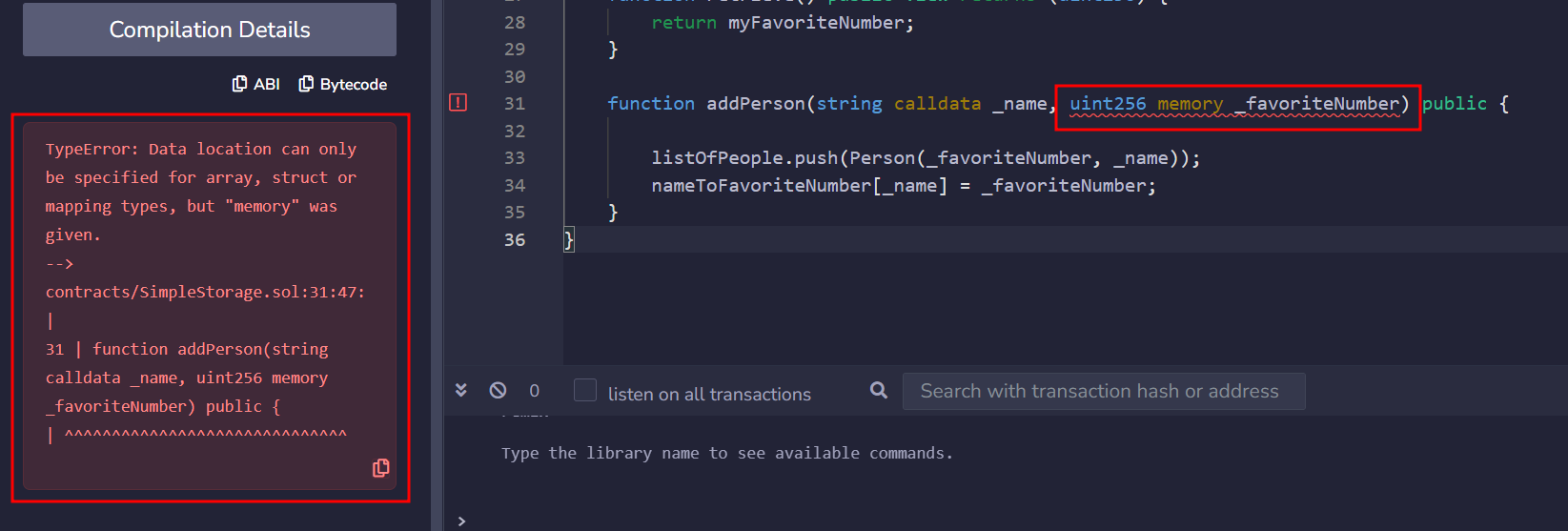5/5
_You can follow along with the video course from here._ ### Introduction In this section, we will explore how Solidity manages data storage, focusing on the differences between storage, memory, and calldata, and why these concepts are crucial for writing optimized and secure smart contracts. ### Data Locations Solidity can store data in **six** different locations. In this lesson, we will focus on the first three: 1. Calldata 2. Memory 3. Storage 4. Stack 5. Code 6. Logs ### Calldata and Memory In Solidity, `calldata` and `memory` are temporary storage locations for variables during function execution. `calldata` is read-only, used for function inputs that can't be modified. In contrast, `memory` allows for read-write access, letting variables be changed within the function. To modify `calldata` variables, they must first be loaded into `memory`. > 🚧 **WARNING** > Most variable types default to a non-storage location automatically (like memory, the stack, etc). However, for strings, you must specify either memory, calldata, or storage due to the way arrays are handled in memory. ```solidity string memory variableName = "someValue"; ``` #### Calldata Calldata variables are read-only and cheaper than memory. They are mostly used for input parameters. In the following example, if we try to replace the keyword `memory` with `calldata`, we receive an error because `calldata` variables can't be manipulated. ```solidity function addPerson(string calldata _name, uint256 _favoriteNumber) public { _name = "cat"; listOfPeople.push(Person(_favoriteNumber, _name)); } ```  ### Storage Variables stored in `storage` are persistent on the blockchain, retaining their values between function calls and transactions. In our contract, the variable `myFavoriteNumber` is a storage variable. Variables which are declared outside any function are implicitly converted to storage variables. ```solidity contract MyContract { uint256 favoriteNumber; // this is a storage variable }; ``` ### Strings and primitive types If you try to specify the `memory` keyword for an `uint256` variable, you'll encounter this error: ```markdown > Data location can only be specified for array, struct, or mapping type ```  In Solidity, a `string` is recognized as an **array of bytes**. On the other hand, primitive types, like `uint256` have built-in mechanisms that dictate how and where they are stored, accessed and manipulated. > 🚧 **WARNING**:br > You can't use the `storage` keyword for variables inside a function. Only `memory` and `calldata` are allowed here, as the variable only exists temporarily. ```solidity function addPerson(string memory _name, uint256 _favoriteNumber) public { // cannot use storage as input parameters uint256 test = 0; // variable here can be stored in memory or stack listOfPeople.push(Person(_favoriteNumber, _name)); } ``` ### Conclusion Well done! You've learned the differences between the keywords storage, memory, and calldata in Solidity, enhancing your skills to develop robust Ethereum-based applications. ### 🧑💻 Test yourself 1. 📕 How does the Solidity compiler handle primitive types and strings in terms of memory management? 2. 📕 Why can't the storage keyword be used for variables inside a function? 3. 🧑💻 Write a smart contract that uses storage, memory and calldata keywords for its variables.
You can follow along with the video course from here.
Introduction
In this section, we will explore how Solidity manages data storage, focusing on the differences between storage, memory, and calldata, and why these concepts are crucial for writing optimized and secure smart contracts.
Data Locations
Solidity can store data in six different locations. In this lesson, we will focus on the first three:
Calldata
Memory
Storage
Stack
Code
Logs
Calldata and Memory
In Solidity, calldata and memory are temporary storage locations for variables during function execution. calldata is read-only, used for function inputs that can't be modified. In contrast, memory allows for read-write access, letting variables be changed within the function. To modify calldata variables, they must first be loaded into memory.
🚧 WARNING
Most variable types default to a non-storage location automatically (like memory, the stack, etc). However, for strings, you must specify either memory, calldata, or storage due to the way arrays are handled in memory.
Calldata
Calldata variables are read-only and cheaper than memory. They are mostly used for input parameters.
In the following example, if we try to replace the keyword memory with calldata, we receive an error because calldata variables can't be manipulated.

Storage
Variables stored in storage are persistent on the blockchain, retaining their values between function calls and transactions.
In our contract, the variable myFavoriteNumber is a storage variable. Variables which are declared outside any function are implicitly converted to storage variables.
Strings and primitive types
If you try to specify the memory keyword for an uint256 variable, you'll encounter this error:

In Solidity, a string is recognized as an array of bytes. On the other hand, primitive types, like uint256 have built-in mechanisms that dictate how and where they are stored, accessed and manipulated.
🚧 WARNING:br
You can't use thestoragekeyword for variables inside a function. Onlymemoryandcalldataare allowed here, as the variable only exists temporarily.
Conclusion
Well done! You've learned the differences between the keywords storage, memory, and calldata in Solidity, enhancing your skills to develop robust Ethereum-based applications.
🧑💻 Test yourself
📕 How does the Solidity compiler handle primitive types and strings in terms of memory management?
📕 Why can't the storage keyword be used for variables inside a function?
🧑💻 Write a smart contract that uses storage, memory and calldata keywords for its variables.
Memory Storage and Calldata
An in-depth look at data locations in Solidity, focusing on the differences and applications of 'memory', 'storage', and 'calldata'. The lesson explains these concepts with examples, clarifying their roles in temporary and permanent data storage within smart contracts.
Previous lesson
Previous
Next lesson
Next
Course Overview
About the course
What you'll learn
Blockchain developer fundamentals
Smart contract ABI
Solidity Smart contract development
Solidity Safemath
Solidity custom errors
Solidity inheritance
Solidity gas optimization techniques
Solidity and Ethereum developer workflow
Course Description
Who is this course for?
- Software engineers
- Web3 developers
- Finance professionals
- Security researchers
- CTOs
Potential Careers
Smart Contract Auditor
$100,000 - $200,000 (avg. salary)
Smart Contract Engineer
$100,000 - $150,000 (avg. salary)
Web3 Developer Relations
$85,000 - $125,000 (avg. salary)
Web3 developer
$60,000 - $150,000 (avg. salary)
Meet your instructors
Guest lecturers:
Last updated on February 5, 2026
Duration: 1h 29min
Duration: 38min
Duration: 1h 54min
Duration: 24min
Course Overview
About the course
What you'll learn
Blockchain developer fundamentals
Smart contract ABI
Solidity Smart contract development
Solidity Safemath
Solidity custom errors
Solidity inheritance
Solidity gas optimization techniques
Solidity and Ethereum developer workflow
Course Description
Who is this course for?
- Software engineers
- Web3 developers
- Finance professionals
- Security researchers
- CTOs
Potential Careers
Smart Contract Auditor
$100,000 - $200,000 (avg. salary)
Smart Contract Engineer
$100,000 - $150,000 (avg. salary)
Web3 Developer Relations
$85,000 - $125,000 (avg. salary)
Web3 developer
$60,000 - $150,000 (avg. salary)
Meet your instructors
Guest lecturers:
Last updated on February 5, 2026

